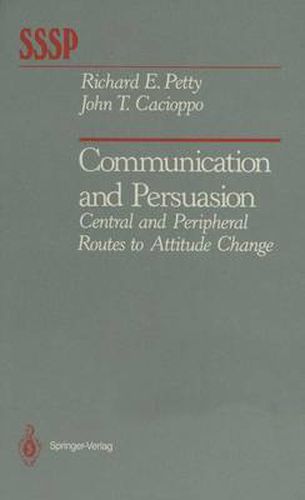Readings Newsletter
Become a Readings Member to make your shopping experience even easier.
Sign in or sign up for free!
You’re not far away from qualifying for FREE standard shipping within Australia
You’ve qualified for FREE standard shipping within Australia
The cart is loading…






This title is printed to order. This book may have been self-published. If so, we cannot guarantee the quality of the content. In the main most books will have gone through the editing process however some may not. We therefore suggest that you be aware of this before ordering this book. If in doubt check either the author or publisher’s details as we are unable to accept any returns unless they are faulty. Please contact us if you have any questions.
It has been over 10 years since we initiated work on our first series of collaborative experiments. As graduate students, we had great fun planning, conducting, and writing this research (Petty & Cacioppo, 1977). We enjoyed arguing with each other at our initial meeting in 1973 and have sub sequently become best friends, but neither of us suspected at the time that we would or could actively maintain a research collaboration over the next decade, or that we would now find ourselves in a position to write this monograph. As we note in Chapter 1, we began our studies of persuasion at a time when social psychology was in crisis, and interest in research on attitude change in particular was declining. As we write this, we are aware of six new volumes on persuasion that are in press or in preparation and that should appear over the next few years. In retrospect, it is not so surprising that research on attitudes and persuasion would reemerge as a central concern of social psychology. We believe that human feelings, beliefs, and behaviors, whether in the domain of interpersonal relations (e. g. , marriage, aggression), politics (e. g. , voting, revolution), health (e. g. , following a medical regimen), or economics (e. g. , consumer purchases) are greatly influenced by the evaluations people have of other people, objects, and issues. Furthermore, evaluations (attitudes) are influenced by affect, cognition, and behavior.
$9.00 standard shipping within Australia
FREE standard shipping within Australia for orders over $100.00
Express & International shipping calculated at checkout
This title is printed to order. This book may have been self-published. If so, we cannot guarantee the quality of the content. In the main most books will have gone through the editing process however some may not. We therefore suggest that you be aware of this before ordering this book. If in doubt check either the author or publisher’s details as we are unable to accept any returns unless they are faulty. Please contact us if you have any questions.
It has been over 10 years since we initiated work on our first series of collaborative experiments. As graduate students, we had great fun planning, conducting, and writing this research (Petty & Cacioppo, 1977). We enjoyed arguing with each other at our initial meeting in 1973 and have sub sequently become best friends, but neither of us suspected at the time that we would or could actively maintain a research collaboration over the next decade, or that we would now find ourselves in a position to write this monograph. As we note in Chapter 1, we began our studies of persuasion at a time when social psychology was in crisis, and interest in research on attitude change in particular was declining. As we write this, we are aware of six new volumes on persuasion that are in press or in preparation and that should appear over the next few years. In retrospect, it is not so surprising that research on attitudes and persuasion would reemerge as a central concern of social psychology. We believe that human feelings, beliefs, and behaviors, whether in the domain of interpersonal relations (e. g. , marriage, aggression), politics (e. g. , voting, revolution), health (e. g. , following a medical regimen), or economics (e. g. , consumer purchases) are greatly influenced by the evaluations people have of other people, objects, and issues. Furthermore, evaluations (attitudes) are influenced by affect, cognition, and behavior.